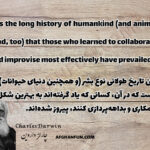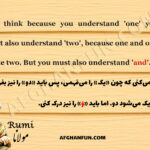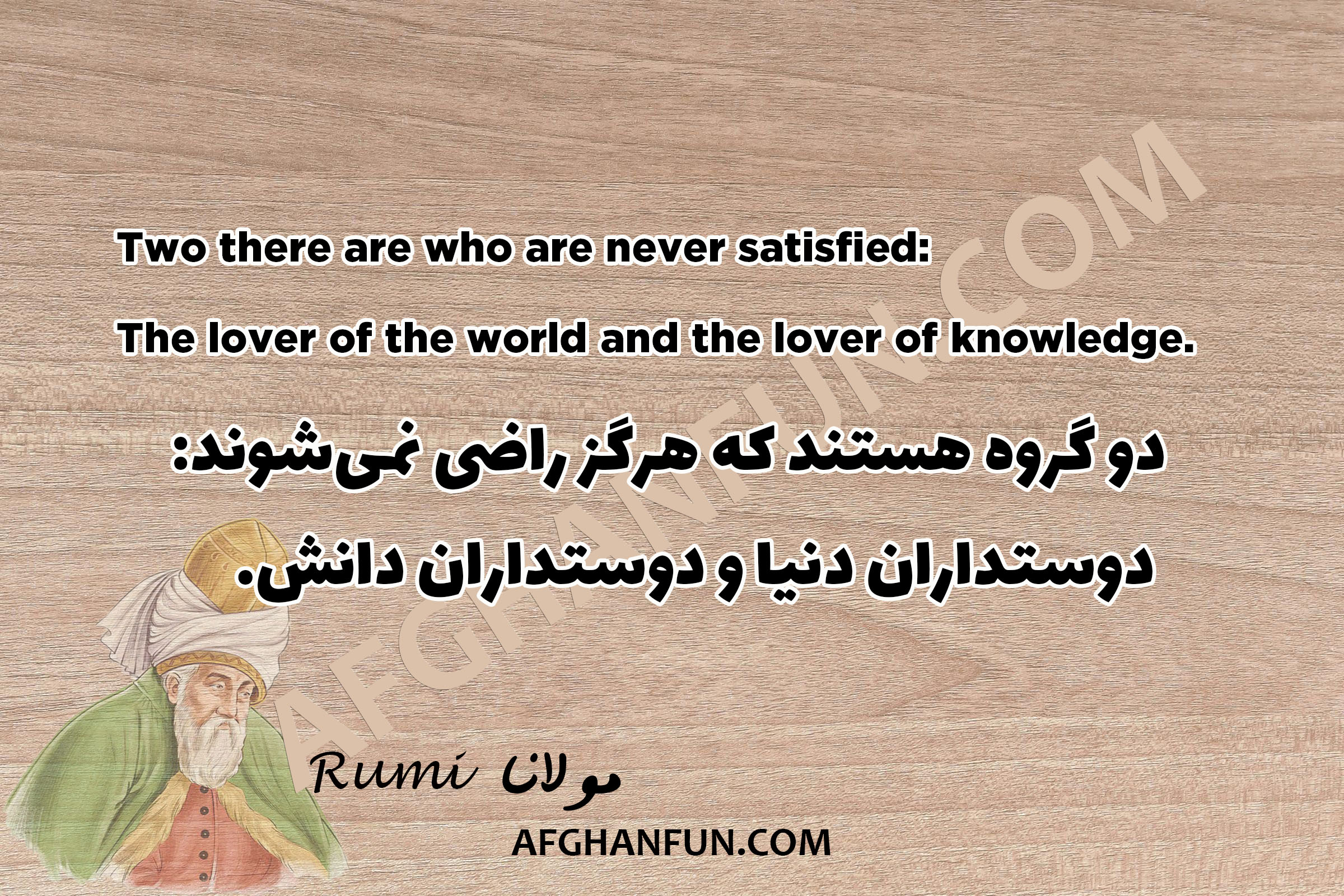The Worldly Lover, The Knowledge Lover: A Tale of Two Unsatisfied Souls
Two there are who are never satisfied: The lover of the world and the lover of knowledge.
Rumi
Two Paths, One Lover: The Dual Nature of Unsatisfied Desire
دو گروه هستند که هرگز راضی نمیشوند: دوستداران دنیا و دوستداران دانش.
مولانا
این نقل قول بیان میکند که دو گروه از مردم همیشه در پی چیزی بیشتر هستند و هرگز احساس رضایت نمیکنند. یکی آنها افرادی هستند که به دنیا و داراییهای مادی وابسته هستند و همیشه به دنبال کسب ثروت و لذتهای دنیوی هستند. گروه دیگر، افرادی هستند که به دنبال کسب دانش و اطلاعات هستند و هرچه بیشتر میآموزند، احساس میکنند که هنوز چیزهای زیادی برای یادگیری وجود دارد. این نقل قول نشان میدهد که وابستگی بیش از حد به دنیا یا دانش میتواند باعث بیقراری و عدم رضایت درونی شود.
Lover Divided: The World’s Allure vs. The Mind’s Pursuit
ду нафар ҳастанд, ки ҳамеша хостанд бештар доранд: якӣ ошиқи ҷаҳон аст ва дигарӣ ошиқи илм.
МАВЛОНО ҶАЛОЛУДДИН МУҲАММАДИ БАЛХӢ
Ин ибораи кутоҳ вале амиқ, ба ду гурӯҳи одамон ишора мекунад, ки ба назар мерасад ҳеҷ гоҳ ба оромӣ ва қаноати дохилӣ намерасанд:
Ошиқи ҷаҳон: Касе ки ба лаззатҳо ва дороиҳои моддии ҷаҳон вобаста аст ва ҳамеша дар паи касби бештар аст.
Ошиқи илм: Касе ки барои касби дониш ва маълумоти бениҳоят мекӯшад ва ҳар қадар бештар меомӯзад, ҳис мекунад, ки ҳанӯз чизҳои зиёде барои омӯхтан вуҷуд дорад.
Ин ибора нишон медиҳад, ки вобастагии зиёда аз ҷаҳон ё илм метавонад боиси беқарорӣ ва надоштани қаноати дохилӣ шавад.
Lover of All, Satisfied by None: Rumi’s Reflection on Desire
هناك اثنان دائما يريدون أكثر: أحدهما عاشق الدنيا والآخر عاشق العلم.
مولانا جلال الدین محمد الرومي
تقول هذه العبارة القصيرة ولكن العميقة إن هناك نوعين من الناس لا يشعرون أبدًا بالرضا والسعادة:
عاشق الدنيا: وهو الشخص الذي يعلق قلبه على متع الدنيا ومادياتها ويسعى دائمًا للحصول على المزيد.
عاشق العلم: وهو الشخص الذي يسعى جاهدًا للحصول على العلم والمعرفة ولا يشبع من ذلك مهما تعلم.
تدل هذه العبارة على أن الإفراط في التعلق بالدنيا أو العلم قد يؤدي إلى عدم الرضا والسعادة الداخلية.
This quote by Rumi touches on the idea of insatiability—specifically the nature of those who pursue external desires (the “lover of the world”) and those who seek intellectual or spiritual knowledge (the “lover of knowledge”). Rumi suggests that both types of individuals, despite their efforts, can never fully satisfy their desires, as these pursuits are endless in nature. Let’s break it down:
1. The Lover of the World:
The “lover of the world” refers to someone who is attached to material wealth, status, physical pleasures, or external validation. This person is constantly chasing after external satisfaction and is often caught in the cycle of desire. No matter how much the world offers—be it success, possessions, or pleasure—it never feels enough. The more one acquires or experiences, the more one feels the need for something else, something more.
In this sense, the lover of the world represents the human tendency to seek fulfillment through the transient and impermanent aspects of life. Rumi suggests that this type of love is fundamentally unfulfilling because worldly things are fleeting and ultimately incapable of providing lasting contentment.
2. The Lover of Knowledge:
The “lover of knowledge,” on the other hand, represents the intellectual or spiritual seeker—someone who is driven by the pursuit of wisdom, understanding, or enlightenment. This can refer to both secular knowledge and spiritual insight. While knowledge has immense value, it is also an infinite pursuit. There is always more to learn, and the more one knows, the more one realizes how much is unknown.
Rumi implies that even the pursuit of wisdom can become a source of dissatisfaction because it leads to the realization of one’s limitations and the vastness of what remains to be learned. The lover of knowledge may find that no matter how much they acquire, they are always confronted with the mystery and complexity of existence.
3. The Common Thread – Insatiability:
Both lovers—the lover of the world and the lover of knowledge—are engaged in pursuits that, by their very nature, cannot be fully satisfied. Their desires are endless, leading to a constant sense of longing or striving. Rumi points to this insatiability as a fundamental aspect of human nature, emphasizing that true fulfillment cannot be found in either external possessions or intellectual achievements alone.
Metaphysical Implication: In a deeper sense, Rumi may be alluding to the limitations of the ego or the self. Both the attachment to worldly things and the attachment to intellectual or spiritual pursuits can be ways of feeding the ego’s desire for control, significance, or understanding. True satisfaction, in Rumi’s worldview, is found not in the endless pursuit of external or internal knowledge, but in surrender to the divine or in embracing the present moment with acceptance and love.
4. Sufi Perspective:
From a Sufi perspective, this quote could also be understood as a critique of the human tendency to separate oneself from the divine. The lover of the world and the lover of knowledge may both be seeking fulfillment in things that are separate from the ultimate reality or divine truth. In Sufism, the true “lover” is the one who seeks union with the Divine (God), and this love transcends the limitations of both worldly desire and intellectual understanding. Such a lover is satisfied in the mystical sense, where desires are extinguished in the embrace of the Infinite.
Conclusion:
Rumi’s quote speaks to the endless pursuit of satisfaction and the futility of seeking fulfillment in external things (the world) or even in intellectual achievements. True contentment, according to Rumi, lies beyond these pursuits, in surrendering to a higher, more holistic understanding of existence. The insatiable nature of both the lover of the world and the lover of knowledge reflects the limitations of the human condition, urging the seeker to look beyond the temporary and the finite, and toward the eternal.
External links:
This Rumi quote, found on “Goodreads“











